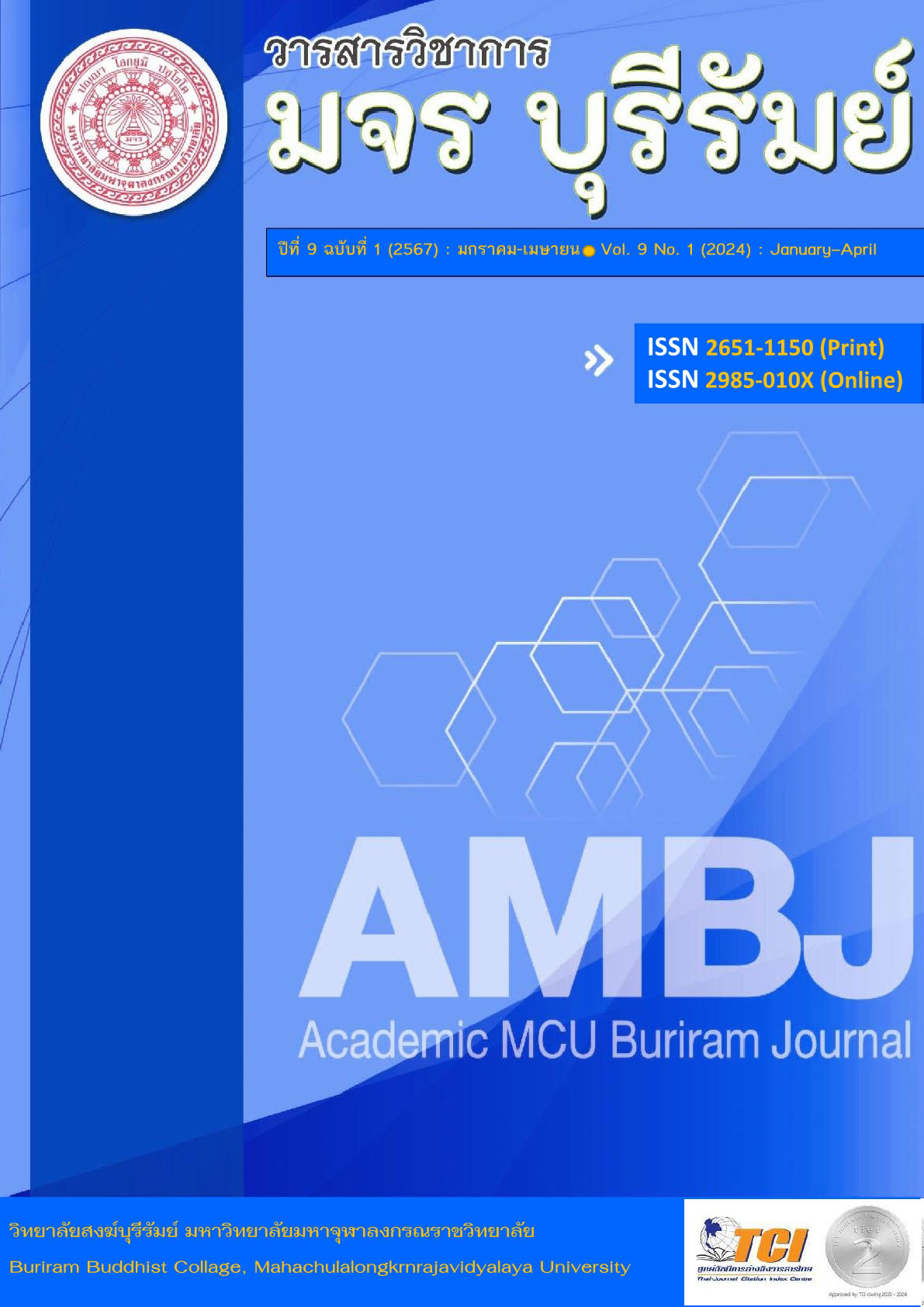The Development the Ability to Think Analytically Scientific Graders Using 4 MAT Learning Management for 6th Grade Students
Keywords:
4 MAT Learning, Analytical Thinking, Scientific SkillsAbstract
The purpose of this research were: 1) to determine the effectiveness of 4 MAT learning management in developing scientific analysis capabilities for 6th-grade students according to the standard 80/80 (E1/E2) and 2) to compare the achievement in the development of scientific analytical thinking ability using 4 MAT learning management for grade 6 students between before and after school. The research design is a quasi-experimental research. The sample group is grade 6 students, Ban Chan Lan School, Phana District Network, Amnat Charoen Primary Educational Service Area Office That is studying in the second semester, 2023, and 17 people from simple random sampling (Simple et al.) using the classroom as a random unit the research tools used are: 1) science learning lesson plan 2) the test measures science learning skills. The statistics used in data analysis are averages, standard deviations, and hypothesis tests with t-tests (Dependent Samples) 3) Assessment of the ability to think scientifically for grade 6 students using the 4 MAT learning management.
The research results found that:
1. The effectiveness of 4 MAT learning management in the development of scientific analysis capabilities for 6th-grade students with efficiency according to the criteria 80.39/80.19.
2. Students have the achievement development of scientific analytical thinking ability using 4 MAT learning management for 6th grade students after studying higher than before studying. Statistically significant at the level.05.
References
กลุ่มโรงเรียนเครือข่ายพนา. (2566). แผนปฏิบัติการกลุ่มโรงเรียนเครือข่ายพนา. อำนาจเจริญ.
จุฑามาศ แจ่มจำรัส. (2565). การพัฒนาความสามารถในการคิดแก้ปัญหาทางวิทยาศาสตร์ และจิตวิทยาศาสตร์ด้วยการจัดการเรียนรู้ปัญหาเป็นฐานร่วมกับเทคนิค STAD ของนักเรียนชั้นประถมศึกษาปีที่ 2. วิทยานิพนธ์ปริญญามหาบัณฑิต สาขาวิชาหลักสูตรและการสอน. บัณฑิตวิทยาลัย: มหาวิทยาลัยศิลปากร.
ธนพล โคตรวิชา. (2565). การพัฒนาทักษะกระบวนการทางวิทยาศาสตร์ของนักเรียนชั้นประถมศึกษาปีที่ 6 เรื่องร่างกายของเรา โดยใช้การจัดการเรียนรู้วัฏจักรการเรียนรู้ 7 ขั้น ร่วมกับผังมโนทัศน์. วิทยานิพนธ์ศึกษาศาสตร์มหาบัณฑิต สาขาวิชาการสอนวิทยาศาสตร์. บัณฑิตวิทยาลัย: มหาวิทยาลัยราชภัฏสกลนคร.
นูรมา อาลี. (2559). ผลการจัดการเรียนรู้แบบ 4 MAT ที่มีต่อผลสัมฤทธิ์ทางการเรียน ความคงทนในการเรียนรู้ และความพึงพอใจต่อการจัดการเรียนรู้ของนักเรียนชั้นมัธยมศึกษาปีที่ 6. วิทยานิพนธ์ปริญญามหาบัณฑิต. บัณฑิตวิทยาลัย: มหาวิทยาลัยสงขลานครินทร์.
บุญชม ศรีสะอาด. (2560). การวิจัยเบื้องต้น. พิมพ์ครั้งที่ 8. กรุงเทพมหานคร: สุวีรยาสาสน์.
ระวีพร แสนพยุห์. (2557). การออกแบบกิจกรรมการเรียนรู้ 4 MAT. วารสารข้าราชการครูและบุคลากรทางการศึกษา, 15(1), 163-176.
สุภาพร อุดไชย. (2564). การจัดการเรียนการสอนตามวัฏจักรการเรียนรู้ 4 MAT. วารสารครุศาสตร์ มหาวิทยาลัยราชภัฎมหาสารคาม, 17(2), 209-224.
สุริยัน เขตบรรจง. (2566). การพัฒนาผลสัมฤทธิ์ทางการเรียนของนักเรียนชั้นมัธยมศึกษาปีที่ 4 เรื่องฟังก์ชันโดยวิธีการเรียนรู้แบบ 4 MAT. Journal of Roi Kaensarn Academi, 8(2), 270-286.
สุวารี ศรีอำไพวิวัฒน์. (2559). ผลการจัดการเรียนรู้แบบ 4 MAT ร่วมกับเทคนิคทีจีที (TGT) ที่มีแรงจูงใจใฝ่สัมฤทธิ์และความสามารถในการแก้ปัญหาทางคณิตศาสตร์ของนักเรียนชั้นมัธยมศึกษาปีที่ 2. วารสารการศึกษาและการพัฒนาสังคม, 12(2), 103-116.
Downloads
Published
How to Cite
Issue
Section
License
Copyright (c) 2024 Academic MCU Buriram Journal

This work is licensed under a Creative Commons Attribution-NonCommercial-NoDerivatives 4.0 International License.
ทัศนะและความคิดเห็นที่ปรากฏในบทความวารสารฉบับนี้ถือเป็นความรับผิดชอบของผู้เขียนบทความนั้น ไม่ถือเป็นทัศนะและความรับผิดชอบของบรรณาธิการ





